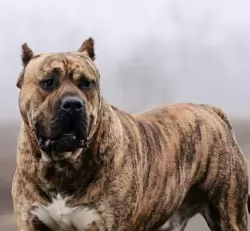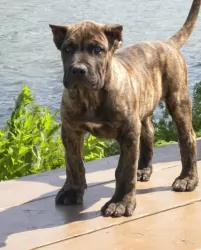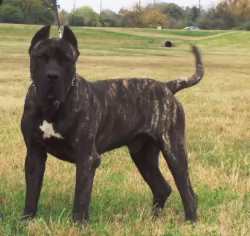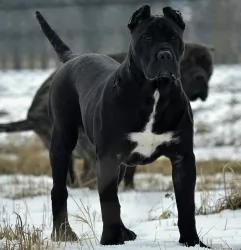 MyDogBreeds
MyDogBreeds Perro de Presa Canario is originated from Spain but Labradoodle is originated from Australia. Both Perro de Presa Canario and Labradoodle are having almost same height. Perro de Presa Canario may weigh 40 kg / 89 pounds more than Labradoodle. Both Perro de Presa Canario and Labradoodle has almost same life span. Both Perro de Presa Canario and Labradoodle has same litter size. Perro de Presa Canario requires Low maintenance. But Labradoodle requires Moderate maintenance
Perro de Presa Canario is originated from Spain but Labradoodle is originated from Australia. Both Perro de Presa Canario and Labradoodle are having almost same height. Perro de Presa Canario may weigh 40 kg / 89 pounds more than Labradoodle. Both Perro de Presa Canario and Labradoodle has almost same life span. Both Perro de Presa Canario and Labradoodle has same litter size. Perro de Presa Canario requires Low maintenance. But Labradoodle requires Moderate maintenance
 This large dog, also known as the Canary Mastiff, is a rare Molosser-type dog hailing from the Canary Islands.
This large dog, also known as the Canary Mastiff, is a rare Molosser-type dog hailing from the Canary Islands.
It does appear as if, according to records, that these dogs were also consumed at one time. The dog has also been used as a cattle dog as well as being used for dog fighting till the middle of the 1900s. Dog fighting was prohibited in the 1940s but it continued for a number of decades.
As people became interested in other dog breeds, the Presa nearly died out but some breeders revived the breed because of it having some good characteristics – territorial, brave, protective and intelligent. The FCI recognized the dog in 2011.
 The Labradoodle is certainly a popular cross breed dog which was developed originally in Australia to be a hypoallergenic guide dog.
The Labradoodle is certainly a popular cross breed dog which was developed originally in Australia to be a hypoallergenic guide dog.
The dog is a cross between a Labrador and a Poodle, possessing some of the excellent characteristics from each dog while also being a low shedding dog.
The Labradoodle became known in 1988 when an Australian breeder, crossed the Labrador Retriever and Standard Poodle. The success of the dog led other breeders to begin breeding with Labradors and Poodles, with breeders wanting to move the dog from hybrid to official breed status. As of today, the Labradoodle isn’t recognized as a breed by the American Kennel Club.
 The Perro de Presa Canario or Canary Dog is large and muscular. He stands at 58 to 66cm in height and weighs anything from 40 – 70kg. He has a deep bark.
The Perro de Presa Canario or Canary Dog is large and muscular. He stands at 58 to 66cm in height and weighs anything from 40 – 70kg. He has a deep bark.
The head is broad and the ears are normally cropped to give him a more aggressive appearance. With ear cropping being banned the ears are close fitting to the head and are floppy. This is one of those dogs where the rear of the dog is slightly higher than the shoulders.
The coat is short and there is no undercoating. It is available in all different shades of fawn and brindle. The breed standard requires the dog having a black mask.
Canine experts tell us that this large working dog has got such fearless guardian characteristics that they wouldn’t recommend this dog for first time dog owners. On the other hand however, there are dog owners who claim that with good socialization, this dog becomes docile and amicable around their human family.
He is a clever dog so training and socialization will be easy and it will be worth it. This is a dog noted for its strength, it’s strong personality and potential for aggression, so training and socialization will be most important.
 The Labradoodle can come in different sizes – miniature, medium and standard. The standard Labradoodle is a large dog which stands at 53 to 63cm and weighs 23 to 30kg.
The Labradoodle can come in different sizes – miniature, medium and standard. The standard Labradoodle is a large dog which stands at 53 to 63cm and weighs 23 to 30kg.
The coat also differs and it can be made up of tight curls or it can be thick and wavy or even straight. The coat is of medium length and is available in lots of colors – cream, apricot, black, whitish, brown and even a brindle color.
Strong and muscular, he has floppy ears and the tail which was once docked, is left long these days and hangs down or it can be carried somewhat upright and curved.
Known as a designer breed, your Labradoodle is sure to be nothing but a pleasure for you, being a 100% companion dog.
Because he comes from two popular dog breeds of which each possess some exceptional characteristics, your Labradoodle could inherit any or all of the characteristics from one or both dogs. He has also been bred to be a hypoallergenic dog which means you aren’t going to have to worry about too much hair flying around. But there again, if he has inherited more of the Labrador’s coat then there will be some shedding.
Because of his amicable nature, he makes a good first-choice dog for first-time dog owners too. The friendly nature of the dog doesn’t make him a particularly good watch dog however.
These are dogs which are happiest when they’re with their human family. They’re a dog breed which is also easy to train because he is intelligent and an eager-to-please dog. He gets on well with children in the home as well as with other pets.
He is the kind of dog that is willing to blend into your lifestyle. If you’re quietly reading indoors he will be lying with you and if you’re pursuing some outdoor activity, he’ll be happy to join right in with you.
The beauty about the Labradoodle is that he can adapt to any kind of lifestyle in the city or countryside, but he wouldn’t be recommended for a place with hardly any garden.He is the kind of dog who will certainly need to be exercised and he will want to join you in your outdoor activities.
It is important to remember that the way your Labradoodle turns out will be affected by socialization and training, his genes and your home and lifestyle.
 Contrary to what many people think, the Perro de Presa Canario can be a calm, gentle dog when trained and socialized properly.
Contrary to what many people think, the Perro de Presa Canario can be a calm, gentle dog when trained and socialized properly.
It is only when you bring an older, unknown dog into your midst that you would have to exercise caution with him as he can then be aggressive.
Dogs become dangerous and aggressive when they are brought up by aggressive, uncaring people. Humans are always to blame for the way a dog turns out. Provide this large dog with a loving, caring home, and he’ll show you what a remarkable pet he can be.
 Maybe it’s the diversity of Labradoodles that makes them so popular – as you never know quite what you’re going to get.
Maybe it’s the diversity of Labradoodles that makes them so popular – as you never know quite what you’re going to get.
Everyone agrees however that these cross-breeds make lovable, wonderful pets - lovely to look at and with all the qualities needed to ensure he is man's best friend. They’re available in 3 sizes but each size is going to make you an incredibly amazing pet and companion.
 The Perro de Presa Canario can live to be between 8 and 12 years of age. Being a large breed the dog can be susceptible to hip dysplasia and other problems such as cancer and heart problems. It is highly unlikely that a well cared for dog will get any of these illnesses.
The Perro de Presa Canario can live to be between 8 and 12 years of age. Being a large breed the dog can be susceptible to hip dysplasia and other problems such as cancer and heart problems. It is highly unlikely that a well cared for dog will get any of these illnesses.
It is far better to give your dog two smaller meals a day as opposed to one bigger meal as then he tends to wolf his food down. This can lead to bloat, where the stomach swells up and worse, it twists. This dangerous situation prevents fluid and air from escaping the stomach. Your dog is restless, he paces and salivates, wanting to vomit. Bloat can affect any dog at any age.
Kidney disease can develop because of some other illness or it can develop on its own. It can even be caused by bad teeth when bacteria enters the bloodstream of the dog.
 Labradoodles can be a little bit unpredictable when it comes to their health because they can inherit problems common to one or both parent breeds. This means you could well have to deal with hip dysplasia or one of the many eye disorders there are.
Labradoodles can be a little bit unpredictable when it comes to their health because they can inherit problems common to one or both parent breeds. This means you could well have to deal with hip dysplasia or one of the many eye disorders there are.
These dogs could well be susceptible to an eye disease known as progressive retinal atrophy which is an inherited disease which can result in blindness.
Because they have floppy ears, the inside of the ear can accumulate dirt, wax and moisture, and this combination can lead to bacteria within the ear and to an infection if nothing is done to clean the inside of the ear. There are products available which can help you to gently clean the ears.
Addison's Disease is a disease found in Poodles and Labradors.It is where the pituitary gland doesn’t create the hormone ACTH. This hormone regulates cortisol and without cortisol, your Labradoodle can’t digest food properly.
Dogs with Addison's disease are usually lethargic, thirsty, they urinate often and they have an abnormally fast heart rate.
 This is a short haired dog, and he isn't a heavy shedder so beyond regular twice-a-week brushing he will simply need to have his eyes and ears checked for infections.
This is a short haired dog, and he isn't a heavy shedder so beyond regular twice-a-week brushing he will simply need to have his eyes and ears checked for infections.
He will also need to have his nails clipped and to check his teeth over too. A sore, bad tooth at the back of your pet’s mouth can cause terrible pain but also play havoc with his general health.
Your Perro de Presa Canario is a high-energy dog and he will need daily exercise. He will love a good walk but he will also need something more strenuous and demanding such as ball- and rope tug-of-war games.
Try and provide your large pet with a top quality commercially manufactured food – one that is packed with vitamins and minerals instead of colorants preservatives and toxic fillers.
Break the monotony of feeding him only kibble by mixing in some cooked chicken, brown rice, sweet potato, carrots and spinach. Dogs love consistency and simplicity and simple meals like this with some raw meat thrown in occasionally will keep him healthy and happy. Never leave him without a constant supply of fresh, cool water.
 Grooming your Labradoodle will be necessary if you want the coat to look bright, vibrant and healthy. Not all Labradoodles will have the same coats, so grooming requirements might be different from dog to dog.
Grooming your Labradoodle will be necessary if you want the coat to look bright, vibrant and healthy. Not all Labradoodles will have the same coats, so grooming requirements might be different from dog to dog.
As with any dog, he will also need a brush-down twice a week. Also your Labradoodle might require trimming or clipping which will help you to maintain the coat in an easier fashion.
Make sure to ensure a top quality diet suited to his size, age and energy levels. Check him over regularly for illnesses and make sure you provide him with lots of love and attention.